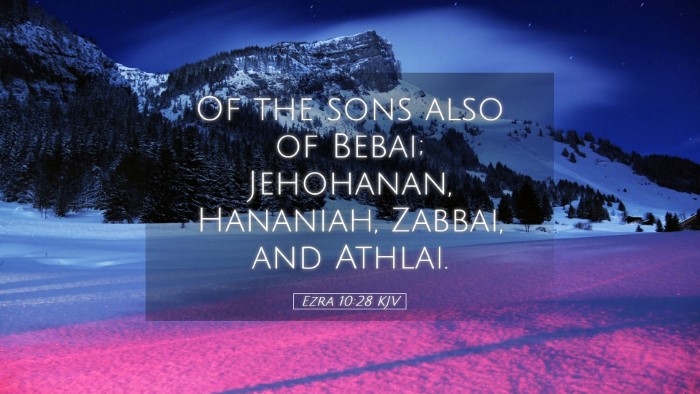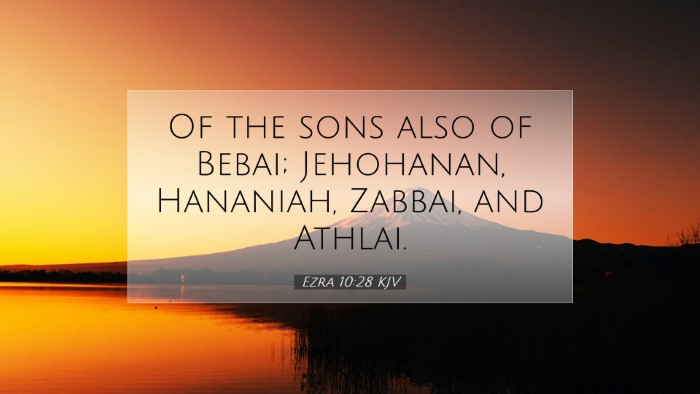Commentary on Ezra 10:28
Introduction
The verse in focus, Ezra 10:28, reads: "And of the sons of Bebai; Jehohanan, Hananiah, Zabbai, and Athlai." This brief mention reflects important themes and historical context of the post-exilic community of Israel. The nuances embedded within this passage evoke thoughts on restoration, community, and the significance of genealogies in Scripture.
Contextual Background
Ezra's narrative, capturing the return of the exiles from Babylon, is foundational for understanding Israel's journey back to a covenant relationship with God. The book of Ezra encompasses themes of repentance, restoration, and the re-establishment of religious practices in Jerusalem. Chapter 10 specifically addresses the issue of intermarriage with foreign nations, an act that raised concerns about cultural and religious integrity among the returning exiles.
Genealogical Significance
Understanding Genealogies
Public domain commentators, such as Matthew Henry, assert that genealogies serve not merely as name collections but as a means to affirm the identity and heritage of Israel. In ancient Israel, lineage played a crucial role in defining social and religious identity. The mention of specific individuals reflects the communal responsibility and the integrity required of the people of God.
- Matthew Henry: Henry emphasizes that genealogies in the Bible establish both the legitimacy of the returned exiles and God's faithfulness across generations.
- Albert Barnes: Barnes notes that the lists of names bring to light the ongoing covenant fidelity of families despite challenges and external influences.
- Adam Clarke: Clarke elaborates that the documentation serves as a reminder of individual and collective accountability in maintaining covenantal relationships.
Thematic Reflections
Restoration and Community
At the heart of Ezra 10:28 is the theme of restoration, not only on an individual basis but within the broader community. The post-exilic period was marked by a collective effort to rebuild not just the physical temple, but also the spiritual life of Israel. Each name mentioned signifies a component of the larger story of renewal.
- Henry suggests that names often represent a community's commitment to returning to God's laws.
- Barnes remarks on how the collective identities of these families demonstrate the importance of unity in overcoming the past mistakes of intermarriage and compromise.
- Clarke emphasizes the challenges faced by the community but highlights the resolution and commitment demonstrated by these families to uphold their heritage and faith.
Lessons for the Church Today
The Relevance of Ezra 10:28
Students, pastors, and theologians can glean vital lessons from the implications of Ezra 10:28 in contemporary contexts:
- The necessity of maintaining a clear and sacred identity amidst diverse cultural influences.
- The call for communal accountability in the church, reflecting the importance of each member's contribution to the overall health of the body.
- Understanding the historical significance of one’s lineage can bolster today’s believers to not only acknowledge their heritage but also to pursue righteousness.
Conclusion
In summary, Ezra 10:28 underscores the importance of community, identity, and the fidelity of God to His covenant promises. Through the lens of historical context and genealogical significance, this verse invites modern believers to reflect on their own commitments to holiness and collective responsibility. Commentators like Matthew Henry, Albert Barnes, and Adam Clarke collectively highlight that the journey of restoration is one anchored in identity, accountability, and fidelity to God's covenant.


